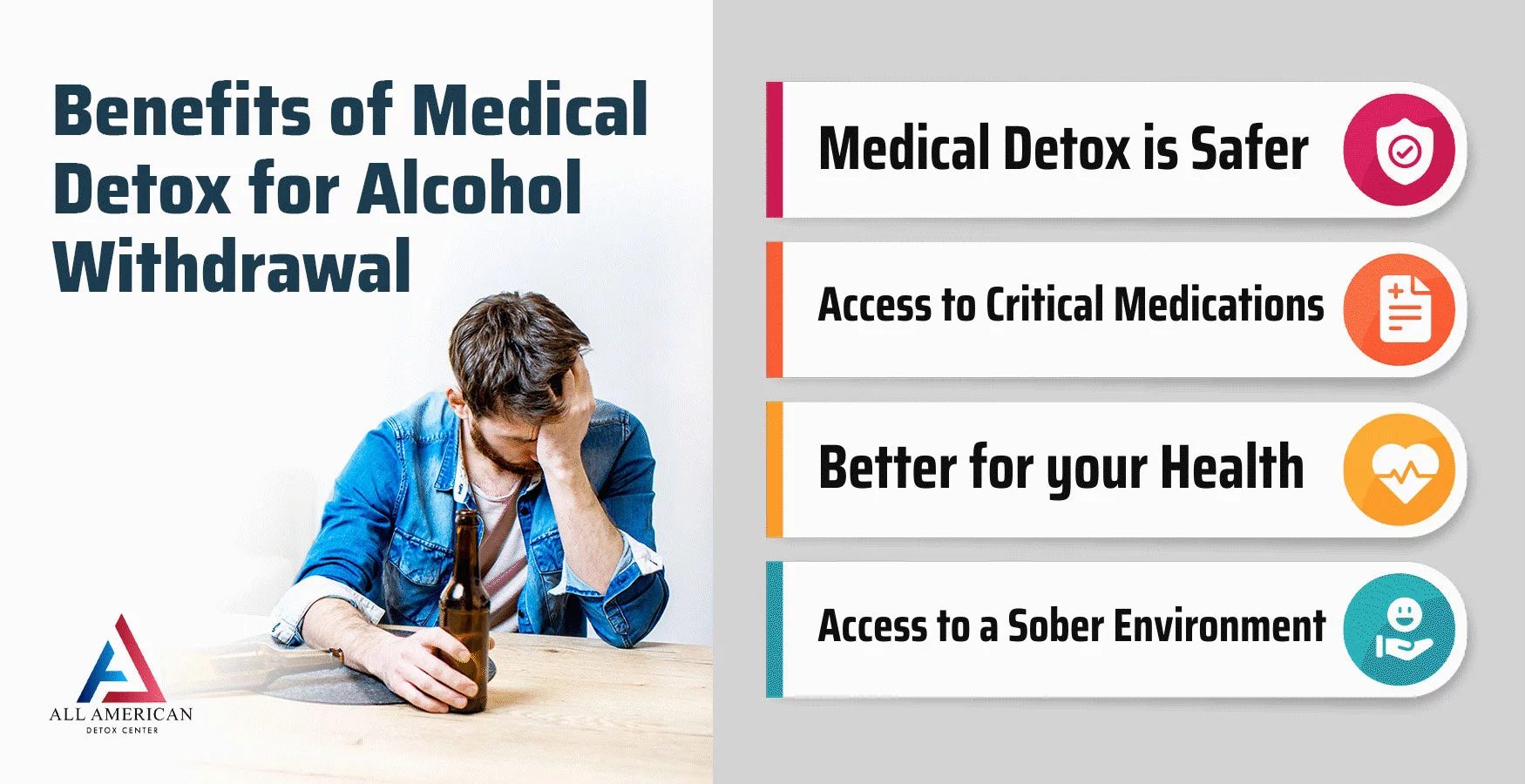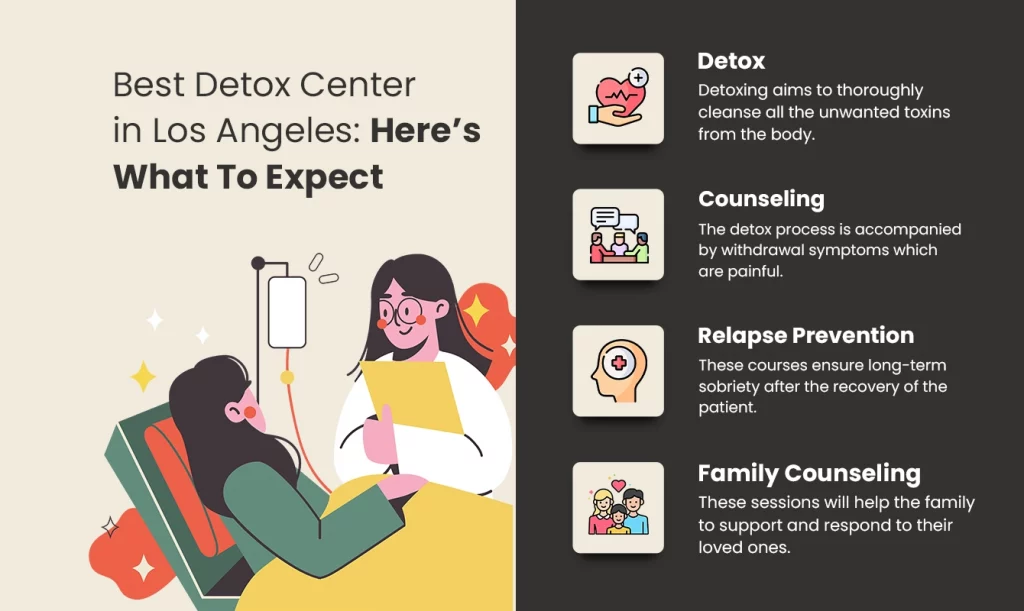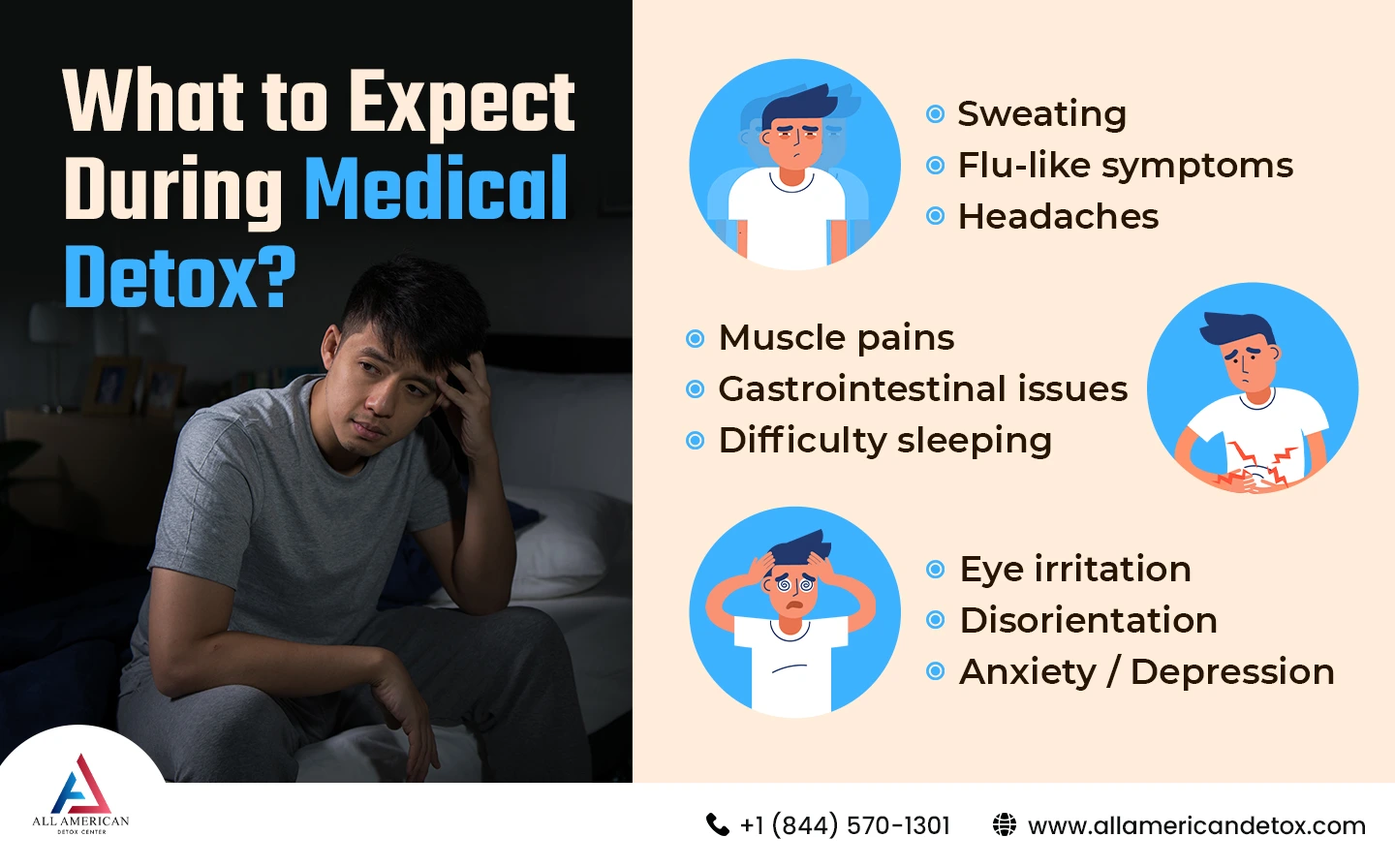Medical detox is a critical first step in the journey toward recovery from substance abuse, particularly in cases of severe addiction. At All American Detox, located in Los Angeles County, we offer comprehensive medical detox programs designed to safely and effectively manage withdrawal symptoms and prepare individuals for further treatment. Our approach combines expert medical supervision with a range of supportive therapies to ensure a smooth and successful detoxification process.
Detoxing in a medically supervised environment provides the necessary safety and support for individuals undergoing withdrawal, which can often be uncomfortable or even dangerous without proper care. All American Detox is dedicated to offering personalized and evidence-based detox solutions to help individuals achieve stability and set the stage for long-term recovery.
Contact Us for Detox Services
What is Medical Detox?
Medical detox refers to the process of removing toxic substances from the body under the supervision of healthcare professionals. This process is essential for individuals with severe addiction issues who may experience significant withdrawal symptoms when they stop using drugs or alcohol. Medical detox aims to manage these symptoms safely and effectively while preparing the individual for further treatment.
During medical detox, patients are monitored by medical professionals who provide medications and interventions to ease withdrawal symptoms and ensure a safe detox process. The goal is to stabilize the individual physically and emotionally, allowing them to transition smoothly into the next phase of their recovery journey.
The Detox Process
The detox process typically begins with a thorough assessment of the individual’s physical and mental health, as well as their substance use history. This assessment helps determine the appropriate level of care and the specific needs of the individual during detoxification.
1. Initial Assessment: The initial assessment involves a detailed evaluation of the individual’s medical history, substance use patterns, and current health status. This information guides the development of a personalized detox plan tailored to the individual’s needs.
2. Medical Supervision: Throughout the detox process, individuals are closely monitored by medical professionals to manage withdrawal symptoms and address any potential complications. Medications may be administered to alleviate discomfort and support the detoxification process.
3. Supportive Care: In addition to medical supervision, individuals receive emotional and psychological support to help them cope with the challenges of detox. Counseling and therapy sessions may be included to address underlying issues and prepare for ongoing treatment.
Types of Detox Programs
There are various types of detox programs available, each designed to meet the specific needs of individuals based on their substance use and health status. These programs can range from inpatient to outpatient settings, depending on the severity of the addiction and the level of care required.
1. Inpatient Detox: Inpatient detox programs provide 24/7 medical supervision and support in a residential setting. This type of program is ideal for individuals with severe addiction issues who require intensive care and a controlled environment to manage withdrawal symptoms safely.
2. Outpatient Detox: Outpatient detox programs offer a less intensive level of care, allowing individuals to live at home while receiving medical supervision and support during scheduled appointments. This option is suitable for individuals with a lower risk of severe withdrawal symptoms and who have a stable home environment.
3. Medical Detox Units: Some detox programs are located within larger treatment facilities and offer specialized medical detox units. These units provide focused care for detoxification while integrating seamlessly with other treatment services available at the facility.
Medical Supervision and Support
Medical supervision is a crucial component of the detox process, ensuring that individuals receive the necessary care and support to manage withdrawal symptoms safely. At All American Detox, our team of medical professionals is dedicated to providing comprehensive supervision throughout the detoxification process.
1. 24/7 Monitoring: Continuous monitoring by healthcare professionals ensures that any changes in the individual’s condition are promptly addressed. This includes tracking vital signs, administering medications, and providing interventions as needed.
2. Personalized Care: Medical supervision at All American Detox is tailored to each individual’s needs, taking into account their specific health conditions and substance use history. This personalized approach helps ensure that the detox process is as safe and comfortable as possible.

Managing Withdrawal Symptoms
Withdrawal symptoms can vary widely depending on the substance used and the individual’s overall health. Effective management of these symptoms is essential for a successful detox process and a smooth transition to further treatment.
1. Medication Management: Medications may be prescribed to alleviate withdrawal symptoms and reduce discomfort. These medications can include anti-anxiety drugs, pain relievers, or medications specifically designed to manage symptoms of withdrawal from particular substances.
2. Supportive Therapies: In addition to medication, supportive therapies such as counseling, relaxation techniques, and nutritional support can help manage withdrawal symptoms and promote overall well-being during detox.
Holistic and Complementary Therapies
Holistic and complementary therapies play a valuable role in supporting the detox process and addressing the individual’s overall well-being. These therapies can enhance the effectiveness of traditional medical treatments and contribute to a more balanced recovery experience.
1. Nutrition and Wellness: Proper nutrition and wellness practices are integral to the detox process. Nutritional counseling and wellness programs can help individuals rebuild their health and support their body’s natural detoxification processes.
2. Mind-Body Practices: Practices such as yoga, meditation, and acupuncture can provide additional support during detox by promoting relaxation, reducing stress, and enhancing emotional well-being.
Developing a Personalized Detox Plan
A personalized detox plan is essential for addressing the unique needs of each individual undergoing detoxification. At All American Detox, we work closely with each person to develop a tailored plan that includes medical, psychological, and emotional support.
1. Customized Approach: The detox plan is customized based on the individual’s substance use history, health status, and personal preferences. This approach ensures that all aspects of the individual’s needs are addressed during the detox process.
2. Collaborative Planning: Developing a personalized detox plan involves collaboration between the individual, their family, and the treatment team. This collaborative approach helps ensure that the plan is comprehensive and aligned with the individual’s recovery goals.
Aftercare and Continued Support
Aftercare and continued support are vital for maintaining progress and preventing relapse after detoxification. All American Detox provides ongoing support to help individuals transition to the next phase of their recovery journey.
1. Aftercare Planning: Aftercare planning includes developing a roadmap for continued treatment and support following detox. This may involve connecting individuals with outpatient therapy, support groups, and other resources to help them maintain their recovery.
2. Continued Support: Ongoing support includes regular check-ins, access to counseling services, and resources for managing challenges that may arise during recovery. Continued support helps individuals stay on track and build a strong foundation for long-term sobriety.
Find Medical Detox in Los Angeles County at All American Detox
Medical detox is a critical step in the recovery process, providing individuals with the necessary medical supervision and support to safely and effectively manage withdrawal symptoms. At All American Detox, our comprehensive approach to medical detox includes personalized care, holistic therapies, and ongoing support to ensure a successful transition to further treatment. By offering a range of detox programs and tailored solutions, we are dedicated to helping individuals achieve stability and set the stage for long-term recovery.
With our expert team and commitment to personalized care, All American Detox is here to support you every step of the way on your journey to recovery. Contact us today to learn more about our medical detox programs and start your path to recovery with expert support and personalized care.
FAQ’s
1. What is medical detox, and why is it important?
Answer: Medical detox is the process of safely withdrawing from substances under medical supervision. It helps manage withdrawal symptoms, prevents complications, and prepares you for ongoing addiction treatment.
2. What substances can be treated through medical detox in Los Angeles County?
Answer: All American Detox offers medical detox for a variety of substances, including alcohol, opioids, benzodiazepines, and other drugs.
3. How long does medical detox typically last in Los Angeles County?
Answer: The duration of medical detox varies depending on the substance and individual factors. Typically, it ranges from 3 to 7 days.
4. What can I expect during medical detox at All American Detox in Los Angeles County?
Answer: Our medical detox program includes:
- Medical evaluation to assess your health and addiction severity.
- Medication-assisted treatment to manage withdrawal symptoms.
- 24/7 monitoring by medical professionals.
- Supportive care to address emotional and psychological needs.
5. Is medical detox painful?
Answer: Withdrawal symptoms can be uncomfortable, but our medical team in Los Angeles County uses medications and therapies to manage discomfort and ensure a safe detox process.
6. What are the benefits of undergoing medical detox at All American Detox in Los Angeles County?
Answer: Our medical detox program offers:
- Increased safety during withdrawal
- Reduced risk of complications
- Improved chances of successful long-term recovery
- Personalized care tailored to your needs
7. What happens after I complete medical detox in Los Angeles County?
Answer: Our team will work with you to develop a personalized aftercare plan, including recommendations for further treatment or support groups.
8. Does insurance cover medical detox in Los Angeles County?
Answer: Many insurance plans cover medical detox. All American Detox can assist in verifying your coverage and understanding your benefits.
9. Is medical detox confidential?
Answer: Absolutely. We prioritize patient confidentiality throughout the detox process. Your personal information is protected.
10. How can I get started with medical detox at All American Detox in Los Angeles County?
Answer: Contact our admissions team for a confidential assessment. We’ll guide you through the process and answer any questions you may have. Your journey to recovery starts here.











